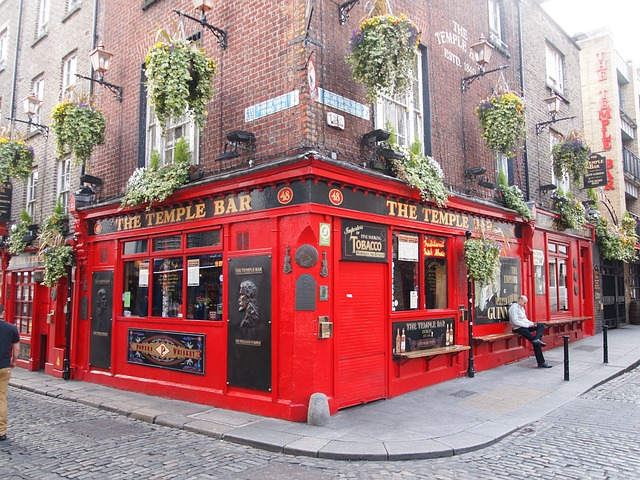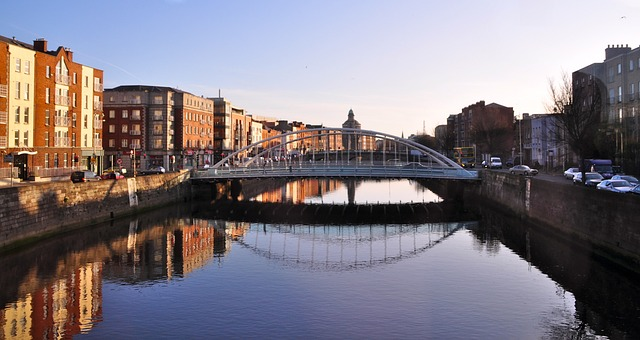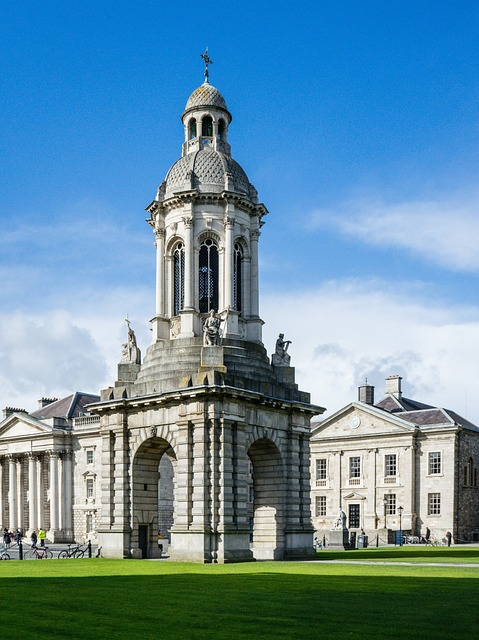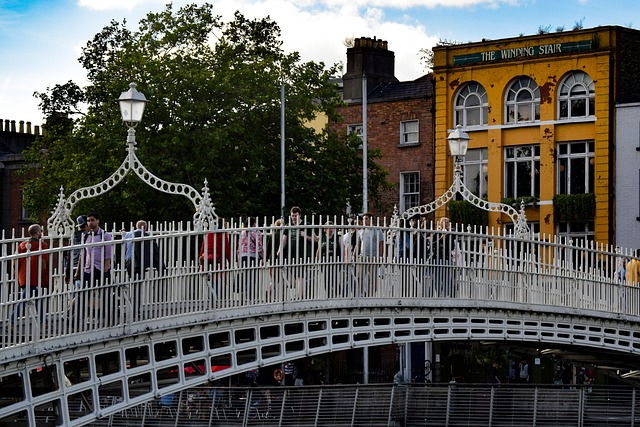Yes, living in Dublin, Ireland, can be quite expensive. The cost of living in Dublin is higher compared to many other cities in Ireland due to factors like high rental prices, increased demand for housing, and the overall economic activity in the city. Essentials such as groceries, transportation, and utilities also tend to be pricier. While salaries in Dublin might be higher, the elevated living expenses can offset these earnings, making it essential to budget carefully and consider all costs when planning to move to or live in Dublin.

Cost of Living in Dublin, Ireland
Dublin's high cost of living is influenced by various factors including housing, transportation, healthcare, and leisure activities. While it offers a high standard of living, it's essential to budget wisely to ensure financial stability.
Housing Costs
Housing costs in Dublin can vary greatly depending on factors such as location, size, and condition of the property. Generally, renting an apartment in the city center is more expensive compared to suburban areas. As of 2024, the average monthly rent for a one-bedroom apartment in Dublin city center is around €1,500 to €2,000, while outside the city center, it can range from €1,200 to €1,600.
Transportation Expenses
Transportation expenses in Dublin, Ireland, can vary depending on your mode of travel and frequency. Public transportation, including buses, trams (Luas), and trains (DART), is generally affordable and convenient. A single adult bus fare ranges from €2.00 to €3.30, while tram fares range from €2.10 to €3.30, and train fares start from €2.30 for short trips. For regular commuters, the Leap Card offers discounts on fares and caps weekly spending, providing an economical option. Additionally, taxis and ride-sharing services are available but can be more expensive, especially during peak times. Overall, budgeting for transportation is crucial to managing living costs in Dublin.
Healthcare Costs
Healthcare costs in Dublin, Ireland, can vary based on whether you use public or private services. Public healthcare is subsidized by the government, making it more affordable, but there may be waiting times for certain treatments. GP visits typically cost around €50-€70 per visit if you're paying out-of-pocket. Prescription medication costs can vary, but there are caps in place for those with medical cards or the Drugs Payment Scheme, limiting monthly expenses to around €114.
Private healthcare offers quicker access to services but comes at a higher cost, with insurance premiums averaging €1,800 to €2,500 per year, depending on the coverage. Understanding these costs is essential for managing your healthcare expenses in Dublin.
Visiting Cork? Here are Best Things to do in Cork Ireland: Awesome Places To Visit, Outdoor Activities to Do
Leisure Activities
Leisure activities in Dublin, Ireland, offer a diverse range of options but come with varying costs. Dining out at restaurants can range from €15-€30 per person for a mid-range meal, while a pint of beer in a pub typically costs around €5-€6. Entertainment options such as movie tickets cost approximately €10-€15, and theater tickets can range from €20-€60 depending on the show.
Outdoor activities, like visiting parks and museums, are often free or have minimal entrance fees, making them budget-friendly options. Gym memberships can cost between €30-€60 per month. Overall, while leisure activities in Dublin can be pricey, there are plenty of affordable and enjoyable options available.
Visiting Dublin? Here are Best Things To Do In Dublin Ireland: In Depth Guide for 2024

Cost of Living in Dublin for Single Person With Rent
The cost of living in Dublin for a single person, including rent, is typically high. On average, a single person can expect to spend around €1,500 to €2,500 per month. This estimate includes rent for a one-bedroom apartment in the city center, which ranges from €1,200 to €1,800 per month, and utilities costing approximately €100 to €150 per month. Groceries, transportation, and other daily expenses add another €400 to €600 monthly. Dublin's high demand for housing and general living expenses contribute to the overall cost, making it essential to budget carefully.
Due to the high demand for rental properties, finding affordable accommodation in Dublin can be challenging. Many renters opt to share accommodation or seek out purpose-built student accommodation to reduce costs. Additionally, some individuals may qualify for government-subsidized housing schemes, although availability may be limited.
Visiting Limerick? Here are Best Things to do in Limerick Ireland
How Much Does Housing Cost in Dublin?
The average monthly rent for a one-bedroom apartment in Dublin city center is around €1,500 to €2,000, while outside the city center, it can range from €1,200 to €1,600. Housing costs in Dublin can vary greatly depending on factors such as location, size, and condition of the property. Generally, renting an apartment in the city center is more expensive compared to suburban areas.
Rental Prices in Dublin
As of 2024, the average monthly rent for a one-bedroom apartment in Dublin city center is around €1,500 to €2,000. This price range may fluctuate based on factors such as the specific neighborhood, amenities offered, and the condition of the property.
Suburban Rental Costs
Outside the city center, rental prices in Dublin can be more affordable. One can expect to pay around €1,200 to €1,600 per month for a one-bedroom apartment in suburban areas. These locations may offer more space and a quieter environment compared to city center living.
Additional Expenses
In addition to rent, individuals renting in Dublin should budget for utilities such as electricity, gas, water, and internet. These expenses can vary depending on usage and the type of accommodation.
What Types of Accommodation are Available In Dublin?
Dublin offers a variety of accommodation options ranging from apartments and townhouses to detached houses. Students and young professionals often opt for shared accommodation or purpose-built student accommodation to reduce costs. Additionally, there are government-subsidized housing schemes available for those eligible.
Apartments
Apartments are a popular choice for individuals and families in Dublin. They range from studio apartments to multi-bedroom units and are available in both city center and suburban locations. Apartment living often offers convenience and amenities such as security, parking, and communal facilities.
Townhouses
Townhouses are another common type of accommodation in Dublin, particularly in suburban areas. These properties typically feature multiple floors with bedrooms, living spaces, and outdoor areas such as gardens or patios. Townhouses offer more space and privacy compared to apartments and are suitable for families or individuals seeking a home-like environment.
Detached Houses
Detached houses are standalone properties with their own land and usually offer the most privacy and space. They are commonly found in suburban and rural areas surrounding Dublin. Detached houses are ideal for families or individuals who prioritize privacy and outdoor space.
Shared Accommodation
Shared accommodation, also known as flat-sharing or house-sharing, involves renting a room within a larger property shared with other tenants. This option is popular among students, young professionals, and individuals on a budget as it allows for cost-sharing and often includes utilities and communal spaces.
Purpose-Built Student Accommodation
Purpose-built student accommodation (PBSA) is specifically designed for students and usually located close to universities and colleges. These accommodations offer individual bedrooms within shared apartments or dormitory-style rooms with communal facilities such as kitchens, lounges, and study areas. PBSA is a convenient and affordable option for students studying in Dublin.
Government-Subsidized Housing
For individuals who meet specific eligibility criteria, government-subsidized housing schemes are available in Dublin. These schemes aim to provide affordable housing options for low-income individuals and families. Eligible applicants may access social housing, rent subsidies, or other forms of assistance to secure accommodation in Dublin.
Is Transportation Expensive in Dublin?
It depends on your mode of transport. The city boasts an extensive public transportation network, including buses, trams, and commuter trains, operated by entities such as Dublin Bus, Luas (light rail), and Irish Rail. These modes of public transport provide convenient access to key destinations across Dublin, making them popular choices for commuters and tourists alike.
Public transportation in Dublin is renowned for its affordability and accessibility, making it an attractive option for those looking to explore the city without the hassle of driving and parking. Fares for Dublin Bus and Luas typically range from €1.50 to €3.00 for a single journey, depending on the distance traveled. Irish Rail fares vary based on factors such as distance, time of travel, and class of service, offering flexibility to passengers with diverse needs and preferences.
While public transportation in Dublin offers an affordable means of getting around, the cost can add up, especially for daily commuters who rely on these services for their daily commute. As such, budget-conscious individuals may explore alternative transportation options such as cycling, walking, or ridesharing services to minimize expenses. Cycling, in particular, has gained popularity in Dublin, with dedicated bike lanes and rental schemes available throughout the city, offering a cost-effective and eco-friendly means of transportation.
Owning a car in Dublin provides convenience and flexibility, particularly for individuals with specific travel requirements or those living in areas with limited public transportation options. However, the cost of owning and operating a car in Dublin can be significant, encompassing expenses such as fuel, insurance, parking, and maintenance. Additionally, congestion and parking fees in the city center can further escalate the overall cost of car ownership, prompting some residents to weigh the pros and cons carefully before committing to this mode of transportation.
Which is the Best Affordable Way to Travel Around Dublin?
The most affordable way to travel around Dublin is by utilizing the extensive public transportation network, which includes buses, trams, and trains operated by Dublin Bus, Luas, and Irish Rail respectively. Investing in a Leap Card, a reloadable smart card, can offer discounted fares for regular commuters.
Public Transportation Options
Dublin Bus operates a comprehensive bus network that covers the entire city and its suburbs, providing frequent services to key destinations. The Luas, Dublin's light rail system, offers two lines - the Green Line and the Red Line - connecting various parts of the city, including major transportation hubs and tourist attractions. Irish Rail operates commuter trains that link Dublin with nearby towns and cities, making it an ideal option for those commuting from the outskirts of the city.
Cost-Effective Fare Options
Investing in a Leap Card is highly recommended for regular commuters, as it offers discounted fares across all modes of public transportation in Dublin. The Leap Card is a reloadable smart card that allows users to top up credit and avail of cheaper fares compared to purchasing single tickets. With the Leap Card, passengers can benefit from reduced fares on Dublin Bus, Luas, and Irish Rail services, making it a cost-effective option for frequent travelers.
Additional Benefits of Public Transportation
Aside from being affordable, public transportation in Dublin offers several other benefits. It is environmentally friendly, reducing the carbon footprint associated with individual car journeys. Moreover, it alleviates traffic congestion, particularly in the city center, contributing to smoother traffic flow and shorter travel times for commuters.
Convenience and Accessibility
Public transportation in Dublin is designed to be accessible to all passengers, including those with disabilities or special mobility requirements. Buses and trams are equipped with wheelchair ramps and priority seating, ensuring that everyone can travel comfortably and safely. Additionally, real-time information displays at bus stops and train stations provide up-to-date schedules and service updates, enhancing the overall convenience of using public transportation in Dublin.

What Are the Costs of Education in Dublin?
Dublin, as the capital of Ireland, boasts a rich educational landscape with several prestigious institutions offering a wide range of academic programs. From universities and colleges to language schools, Dublin attracts students from around the world seeking quality education in diverse fields. While the city's educational offerings are esteemed, the cost of education in Dublin can vary depending on factors such as the level of study, the institution, and the specific program pursued.
At the tertiary level, Dublin is home to several esteemed universities, including Trinity College Dublin, University College Dublin (UCD), and Dublin City University (DCU), among others. These universities offer undergraduate, postgraduate, and doctoral programs across various disciplines, ranging from arts and humanities to science and technology. The total cost of tuition fees for international students pursuing undergraduate degrees at these universities can range from approximately €10,000 to €25,000 per year, depending on the program and institution. Postgraduate programs may have higher tuition fees, with some specialized courses costing upwards of €30,000 per year.
In addition to universities, Dublin hosts numerous colleges and institutes offering vocational and professional courses in areas such as business, engineering, healthcare, and arts. These institutions often provide more specialized and practical training tailored to specific industries and career paths. Tuition fees for programs at colleges and institutes in Dublin can vary widely depending on the duration and nature of the course, with shorter vocational courses typically being more affordable compared to longer academic programs.
Language schools are another prominent feature of Dublin's educational landscape, attracting students from around the world who wish to improve their English language skills. These schools offer a range of courses, including general English language courses, exam preparation courses (such as IELTS or TOEFL), and specialized courses in areas such as business English or academic English. Tuition fees for English language courses in Dublin vary depending on factors such as the duration of the course, the intensity of study, and the reputation of the school. Short-term courses may cost a few hundred euros, while longer-term intensive courses can range from €1,000 to €2,000 or more per term.
Living Expenses in Dublin for International Students
Studying abroad in Dublin is an exciting and enriching experience, but it's essential for international students to budget carefully for their living expenses. From tuition fees to accommodation, food, transportation, and other essentials, there are various costs to consider when planning for life as a student in Dublin.
Tuition Fees
Tuition fees for international students in Dublin can vary depending on the level of study and the institution. Universities typically charge higher fees for undergraduate and postgraduate programs compared to colleges and language schools. It's important for international students to research the tuition fees for their chosen program and institution well in advance and budget accordingly.
Accommodation
Accommodation is one of the most significant expenses for international students in Dublin. The cost of rent can vary depending on factors such as location, size, and type of accommodation. Many international students choose to live in university-managed accommodation, which may include on-campus residences or off-campus housing options. Alternatively, students may opt for private rental accommodation or shared housing to reduce costs.
Food
Food expenses can also constitute a significant portion of an international student's budget in Dublin. While dining out at restaurants and cafes can be enjoyable, it's essential to budget for groceries and cooking at home to save money. Shopping at supermarkets and cooking meals in shared accommodation can help international students manage their food expenses more effectively.
Transportation
Transportation costs should also be factored into an international student's budget in Dublin. While public transportation is relatively affordable, with options such as buses, trams, and trains operated by Dublin Bus, Luas, and Irish Rail, respectively, the cost can add up, especially for daily commuters. Investing in a Leap Card, a reloadable smart card, can offer discounted fares for regular travelers and help international students save money on transportation expenses.
Other Living Expenses
In addition to tuition fees, accommodation, food, and transportation, international students should budget for other living expenses such as utilities, textbooks, healthcare, and personal expenses. It's essential to plan ahead and set aside funds for unexpected costs or emergencies to ensure financial stability during the duration of the study abroad experience.
Financial Aid and Scholarships
Many universities in Dublin offer scholarships, grants, and financial aid programs to support international students with their living expenses. These funding opportunities can help alleviate the financial burden and make studying abroad in Dublin more accessible to students from diverse backgrounds. International students are encouraged to explore scholarship options and apply for financial aid to help offset the costs of living and studying in Dublin.

Is Dublin Expensive Compared To Other Irish Cities?
The cost of living in Dublin is significantly higher due to factors such as high housing costs, increased demand for goods and services, and the overall economic activity in the capital. Rent in Dublin is particularly high, with prices often double those in cities like Cork or Galway. Additionally, everyday expenses such as groceries, dining out, and transportation are more expensive in Dublin. While salaries may be higher in Dublin, the increased cost of living can offset these earnings, making it essential to budget carefully when living in the city.
Is Dublin More Affordable Than Cork?
No, Cork is generally more affordable than Dublin.
Cork, located in the south of Ireland, offers a lower cost of living compared to Dublin. This affordability is particularly evident in housing and transportation expenses. In Cork, the cost of renting accommodation, whether it's apartments or houses, tends to be significantly lower than in Dublin. This is primarily due to the lower demand and population density in Cork compared to the bustling capital city. Additionally, property prices in Cork are generally more affordable, making it an attractive option for individuals and families looking to purchase a home.
Transportation expenses in Cork are also more affordable compared to Dublin. While both cities have efficient public transportation systems, the cost of fares and commuting in Cork is typically cheaper than in Dublin. This can be attributed to factors such as lower congestion levels and shorter commuting distances in Cork, resulting in reduced transportation costs for residents.
Overall, the lower cost of living in Cork makes it an appealing alternative to Dublin for individuals seeking a more affordable lifestyle. Whether it's lower housing costs, cheaper transportation expenses, or overall reduced living expenses, Cork offers a more budget-friendly environment without compromising on quality of life. However, it's essential to consider factors such as employment opportunities, amenities, and personal preferences when comparing the two cities to determine the best fit for individual needs and circumstances.
Is Dublin More Expensive Than Galway?
Yes, Dublin is generally more expensive than Galway.
Galway, located on the picturesque west coast of Ireland, boasts a slightly lower cost of living compared to Dublin. One of the significant factors contributing to this difference is the housing prices. In Galway, housing prices are typically lower compared to Dublin, making it more affordable for residents in terms of rent or property purchase. The lower demand and population density in Galway contribute to this affordability, allowing residents to find accommodation at a more reasonable cost compared to Dublin's competitive housing market.
While housing affordability is a significant aspect, it's essential to consider other factors when comparing the overall cost of living between Dublin and Galway. Employment opportunities play a crucial role in affordability, as higher wages in Dublin may offset the higher living costs to some extent. Dublin, being the economic hub of Ireland, offers a broader range of job opportunities across various industries compared to Galway. However, it's worth noting that Galway has a thriving economy, particularly in sectors such as technology, healthcare, and tourism, providing employment opportunities for residents.
Additionally, amenities and lifestyle preferences can impact the cost of living comparison between the two cities. Dublin, as the capital city, offers a more extensive range of amenities, entertainment options, cultural activities, and dining experiences compared to Galway. While these amenities contribute to a vibrant lifestyle, they may come at a higher cost in Dublin compared to Galway.
In summary, while Galway offers a slightly lower cost of living compared to Dublin, it's essential to consider various factors such as housing prices, employment opportunities, and lifestyle preferences when making a comparison. While Galway may be more affordable in terms of housing, Dublin's broader range of job opportunities and amenities may appeal to individuals seeking a bustling urban lifestyle. Ultimately, the choice between Dublin and Galway depends on individual circumstances, priorities, and preferences.
Is Dublin Cheaper Than Limerick?
No, Limerick is generally cheaper than Dublin.
Limerick, situated in the mid-west of Ireland, is indeed known for its lower cost of living compared to Dublin. One of the primary factors contributing to this affordability is the housing costs. In Limerick, housing prices are generally lower than those in Dublin, making it more accessible for individuals and families on a budget. Whether renting accommodation or purchasing property, residents of Limerick can typically find housing options at a more affordable price compared to Dublin's competitive real estate market.
The lower housing costs in Limerick can be attributed to factors such as lower demand, population density, and overall cost of living compared to Dublin. While Dublin serves as the economic and cultural hub of Ireland, attracting a large population and driving up housing prices, Limerick offers a more relaxed pace of life with a lower cost of living, particularly in terms of housing expenses.
Apart from housing affordability, other aspects of the cost of living in Limerick may also be lower compared to Dublin. Expenses such as groceries, dining out, transportation, and entertainment options may come at a more reasonable cost in Limerick due to its smaller size and less bustling urban environment compared expensive cities such to Dublin.
FAQs On Is It Expensive To Live In Dublin Ireland?
Is Dublin a Expensive City to Live in?
Dublin is considered relatively expensive compared to other cities in Ireland, particularly in terms monthly costs of housing and transportation.
What Are the Average Living Expenses in Dublin?
The average living expenses in Dublin vary depending on factors such as accommodation, lifestyle, and personal preferences. However, a single person can expect to spend a minimum wage or significant portion of their income on rent, transportation, and other essentials.
Are There Affordable Housing Options in Dublin?
While housing prices in Dublin can be high, there are affordable options available such as shared accommodation, government-subsidized housing, and purpose-built student accommodation.
